Mostrar el registro sencillo del ítem
dc.contributor.author
Mondaca, Sofía Natalia

dc.date.available
2024-02-08T11:57:27Z
dc.date.issued
2023-10
dc.identifier.citation
Mondaca, Sofía Natalia; La máquina de hacer pan: Un análisis del conocimiento tácito involucrado en el ejercicio de habilidades prácticas y el comportamiento de artefactos; Universidade Federal do Recôncavo da Bahia; Griot; 23; 3; 10-2023; 235-251
dc.identifier.uri
http://hdl.handle.net/11336/226295
dc.description.abstract
A finales de la década de los ‘80, Matsushita Electric Industrial Co. Ltd. largó a la venta la primera máquina panificadora de uso doméstico. Su lanzamiento gozó de tal éxito, que sociólogos del conocimiento se abocaron a analizar el conocimiento involucrado en su diseño y producción. Para ello, Takeuchi y Nonaka (1995) analizaron detalladamente la noción de conocimiento tácito (POLANYI, 1966/2009). Defendieron que los ingenieros y desarrolladores lograron explicitar y traducir el conocimiento tácito presente en el ejercicio habilidoso del maestro panadero al diseño de la máquina de hacer pan, reproduciendo el mismo resultado práctico. En el presente trabajo, discutiré su interpretación de la noción de conocimiento tácito y defenderé que el conocimiento tácito involucrado en el ejercicio de habilidades prácticas no puede explicitarse y traducirse en el diseño de la máquina de hacer pan sin perder, al menos, una parte sustancial de dichas habilidades. Para ello, me valdré de aportes de la sociología de la ciencia y de la fenomenología para argumentar que el conocimiento tácito involucrado en el ejercicio habilidoso de nuestro maestro panadero depende de una relación de familiaridad con el entorno. Dicha relación es epistémicamente relevante en la medida en que involucra representaciones aspectuales de nuestro entorno, las cuales permiten guiar la acción de nuestro maestro panadero. A diferencia, la máquina de hacer pan no posee tales representaciones y, en consecuencia, no puede implicar, al menos, el mismo tipo de conocimiento tácito como guía de su comportamiento.
dc.description.abstract
In the late 1980s, Matsushita Electric Industrial Co. Ltd. released the first home-use bread making machine. Its launch was so successful that knowledge sociologists undertook the task of analyzing the knowledge involved in its design and production. To accomplish this, Takeuchi and Nonaka (1995) extensively examined the concept of tacit knowledge (POLANYI, 1966/2009). They argued that engineers and developers managed to articulate and translate the tacit knowledge inherent in the skilled practice of a master baker into the design of the bread-making machine, reproducing the same practical outcome. In the present study, I will discuss their interpretation of the notion of tacit knowledge and contend that the tacit knowledge involved in the exercise of practical skills cannot be articulated and translated into the design of the bread making machine without losing, at the very least, a substantial portion of those skills. To support this argument, I will draw on contributions from the sociology of science and phenomenology to argue that the tacit knowledge embedded in the skilled practice of our master baker depends on a familiarity relationship with the environment. This relationship is epistemically relevant insofar as it involves aspectual representations of our environment, which guide the actions of our master baker. In contrast, the bread making machine lacks such representations and, as a result, cannot involve, at the very least, the same type of tacit knowledge as a guide for its behavior.
dc.format
application/pdf
dc.language.iso
spa
dc.publisher
Universidade Federal do Recôncavo da Bahia
dc.rights
info:eu-repo/semantics/openAccess
dc.rights.uri
https://creativecommons.org/licenses/by/2.5/ar/
dc.subject
MÁQUINA DE HACER PAN
dc.subject
CONOCIMIENTO TÁCITO
dc.subject
HABILIDADES PRÁCTICAS
dc.subject
REPRESENTACIONES ASPECTUALES
dc.subject.classification
Otras Filosofía, Étnica y Religión

dc.subject.classification
Filosofía, Ética y Religión

dc.subject.classification
HUMANIDADES

dc.title
La máquina de hacer pan: Un análisis del conocimiento tácito involucrado en el ejercicio de habilidades prácticas y el comportamiento de artefactos
dc.title
The bread making machine: An analysis of the tacit knowledge involved in the exercise of practical skills and the behavior of artifacts
dc.type
info:eu-repo/semantics/article
dc.type
info:ar-repo/semantics/artículo
dc.type
info:eu-repo/semantics/publishedVersion
dc.date.updated
2024-02-08T10:17:36Z
dc.identifier.eissn
2178-1036
dc.journal.volume
23
dc.journal.number
3
dc.journal.pagination
235-251
dc.journal.pais
Brasil

dc.journal.ciudad
Amargosa
dc.description.fil
Fil: Mondaca, Sofía Natalia. Consejo Nacional de Investigaciones Científicas y Técnicas. Centro Científico Tecnológico Conicet - Córdoba. Instituto de Humanidades. Universidad Nacional de Córdoba. Instituto de Humanidades; Argentina
dc.journal.title
Griot
dc.relation.alternativeid
info:eu-repo/semantics/altIdentifier/url/https://periodicos.ufrb.edu.br/index.php/griot/article/view/3536
Archivos asociados
